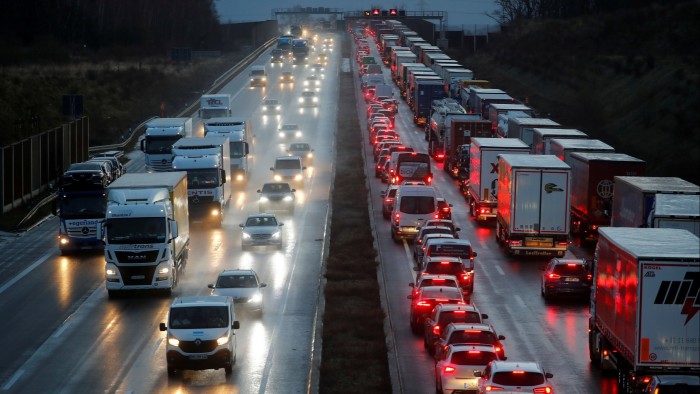Stay informed with free updates
Simply sign up to the Climate change myFT Digest — delivered directly to your inbox.
EU countries have significantly weakened a plan to cut greenhouse gas emissions after countries, including Italy and Romania, made a last-minute push to delay a landmark carbon pricing system and to allow governments to outsource emissions reductions to other countries.
The overarching target, which commits EU countries to reduce emissions by 90 per cent by 2040 compared with 1990 levels, was seen as a symbol of the bloc’s ambitious green agenda ahead of the UN’s COP30 climate conference in Brazil next week.
The goal was formally agreed by EU governments on Wednesday morning after 18 hours of negotiations. Member states also agreed to cut emissions by between 66.3 per cent and 72.5 per cent by 2035 as part of a submission to the UN that has to be made ahead of the COP30 summit.
But several member states refused to agree to the legally binding 2040 goal unless significant concessions were made that would allow countries to claim 5 per cent of their emissions reductions by selling international carbon credits.
Carbon credits are permits that represent one tonne of carbon dioxide removed from the atmosphere, but as yet there is no watertight global system guaranteeing their credibility.
The final agreement could also allow countries to claim a further 5 per cent of the goal through international credits in case of emergencies, such as wildfires, and for them to review the 90 per cent target every two years in case it is causing economic setbacks. It also delays the start of an emissions trading system for homes and road transport that has proved controversial, particularly in eastern European countries that fear a backlash from voters.
Wopke Hoekstra, the EU’s climate commissioner, tried to defend the deal, saying it had been “broadly supported” by member states and that it was “absolutely science-based”.
“The planet doesn’t care where we reduce emissions — that is just the logic of physics,” he said.
The EU’s scientific advisory board has previously said that the bloc should cut emissions by at least 90 per cent without the use of international credits.
Ambitious countries, such as the Netherlands, Sweden and Spain, tried to push back against efforts to weaken the goal but several EU diplomats from those countries said that they preferred a less ambitious agreement to none at all. “It was take it or leave it,” one European official said.
Spain’s environment minister Sara Aagesen said ahead of the meeting that Europe needed to “show the world that we are leaders in climate change” and “deliver adequate signals to investors”, noting that the UN climate summit was taking place in an “extraordinarily complex context”.
Officials noted that Italy played an outsized role in the talks, making demands for reviews of policy for vehicles and fuels.
Four countries, including Hungary and the Czech Republic, opposed the goal, which was approved by a weighted majority of member states. It must now be agreed with the European parliament before becoming law.
Germany broke its coalition agreement, which backed only 3 per cent of the target being met by international carbon credits, in order to approve the law.
The EU has traditionally been among the most ambitious negotiators at COP, but with its climate agenda under pressure from both rightwing politicians and trading partners such as the US, campaigners fear that the weakened target will undermine its diplomatic arguments as it tries to keep other countries on board with reducing emissions sufficiently to avoid devastating climate events in future.
Recommended
“At stake” is “our diplomatic credibility when it comes to environment and climate policy”, said Lidia Pereira, a member of a group of EU lawmakers attending COP. “It is a responsibility of the European Union to show that you can decarbonise and grow, but this is an effort that has to be shared.”
Jacob Werksman, the EU’s chief COP negotiator, said at an event on Tuesday that it was crucial that the summit in Brazil was an opportunity for countries to show that the Paris agreement, which commits countries to keep global warming to within 2C of pre-industrial levels, was “working” because countries “were taking their obligations seriously”.
He added that this was even more critical in the absence of the US, after President Donald Trump withdrew his country from the Paris accord.
A previous experiment by the EU to integrate international carbon credits into its climate rule book collapsed in 2012 due to oversupply and low demand.
Hoekstra said the commission would set out the conditions for using the credits.
“For the credibility of the whole system . . . it needs to be verified, it needs to be additional, it needs to have the gold standard in terms of impact.”
Climate Capital
Where climate change meets business, markets and politics. Explore the FT’s coverage here.
Are you curious about the FT’s environmental sustainability commitments? Find out more about our science-based targets here


